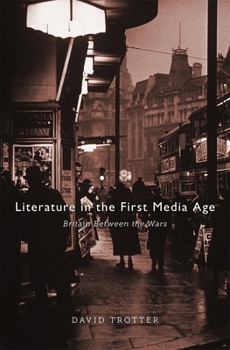Literature in the First Media Age: Britain Between the Wars
The period between the World Wars was one of the richest and most inventive in the long history of British literature. Interwar literature, David Trotter argues, stood apart by virtue of the sheer intelligence of the enquiries it undertook into the technological mediation of experience. After around 1925, literary works began to portray communication by telephone, television, radio, and sound cinema--and to examine the sorts of behavior made possible...
Format:Hardcover
Language:English
ISBN:0674073150
ISBN13:9780674073159
Release Date:December 2013
Publisher:Harvard University Press
Length:352 Pages
Weight:1.56 lbs.
Dimensions:1.1" x 6.2" x 9.3"
Customer Reviews
0 rating





